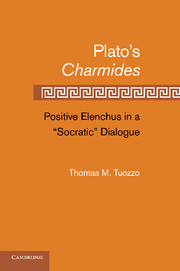1 - Methodological Preliminaries
Published online by Cambridge University Press: 05 February 2012
Summary
Interpreting the Charmides
The Charmides is a brilliant dialogue, as well as a puzzling one. The charm and urbanity of its opening scene are matched by the sophistication and extraordinary abstraction of the arguments that follow. The juxtaposition of these very different sorts of brilliance raises in an acute form a central question of Plato interpretation: How are the literary and the argumentative dimensions of a Platonic dialogue related to each other? Specific details both of the dialogue’s dramatic setting and of its dialectical argumentation give rise to other interpretive questions, especially when they are viewed within the chronological framework that has until recently guided most contemporary Plato scholarship. Because the dialectical discussion of the dialogue is conducted by Socrates, is concerned with defining a virtue, does not explicitly invoke transcendent Forms, ends in apparent failure, and has a vivid dramatic setting, the dialogue is generally thought to belong to a group of “early,” “Socratic” dialogues. Yet the sophistication of the argumentation, as well as some particular substantive content of those arguments, gives our dialogue an affinity with dialogues generally viewed as “middle” or even “late.” Perhaps even more problematic for the classification of the dialogue as early is that what seems to be Socrates’ primary activity in the “early” dialogues, and what Socrates appears to claim in one of those dialogues (the Apology) to be his life mission – namely, examining people to determine whether they know what they think they know – is in this dialogue itself subjected to prolonged examination, in the course of which it seems to be thoroughly discredited.
- Type
- Chapter
- Information
- Plato’s CharmidesPositive Elenchus in a 'Socratic' Dialogue, pp. 3 - 51Publisher: Cambridge University PressPrint publication year: 2011



